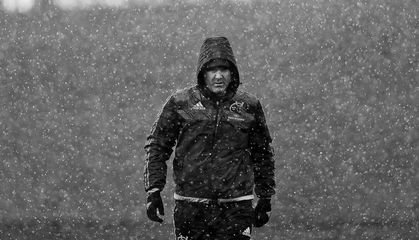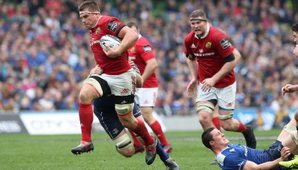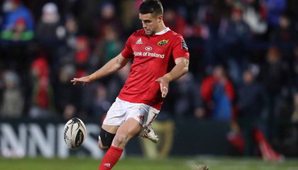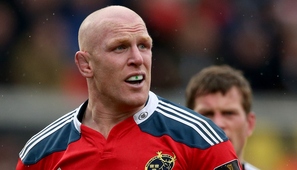Sunday morning changed everything, the game plunged into a perspective almost too grim to imagine by news from France as tragic as it was shocking. Anthony Foley had gone there for the start of his 22nd European campaign with Munster, just as he had always gone there since the very first occasion, at Castres 21 years ago.
As head coach, all the preparation for the next day's challenging tie against the thoroughbreds of Racing at the old Stade Colombes had been done. He would have rejoiced at the way Connacht bounced off the ropes to outpoint Toulouse and would have been mightily impressed by the Warriors the night before.
Their destruction of Leicester Tigers at Scotstoun would have had special significance given their scheduled arrival in Limerick this coming weekend. That could wait. Foley was never one to get ahead of himself, a rigid subscriber to the one-game-at-a-time mantra.
Nobody in his or her worst nightmare could have envisaged that 'Axel' would not be around. Whenever Munster played, be it next week, next month, next year or at the start of the next decade, he would be around because he always had been. At 42, there ought to have been plenty of tomorrows.
The ghastly reality that he would not live to see another match made his passing all the more devastating. The Guinness PRO12 had lost one of its own, a folk hero revered in his native province and admired everywhere else on the rugby planet, not just as a match-winning No 8 but for upholding the old values.
His popularity knew no bounds, as reflected by the torrent of tributes from the top down, from the President of Ireland, Michael D Higgins, national Rugby Unions across the globe, players old and young, friends and those battalions of the Red Army who enlisted in support of Munster's European pioneers.
Foley, alone of the team involved at the very beginning, against Swansea on November 1, 1995, stayed the course, climbing ever upwards like a mountaineer in pursuit of the ultimate frontier.
When he and Munster's largely home-grown pack of Limerick lads got there, beating Biarritz in the 2006 final, how fitting that it was Foley who lifted the shining symbol of his native province's continental conquest.
He may have belonged to Shannon, Munster and Ireland but Foley the man wouldn't have had the foggiest clue that the sense of belonging extended to the wider rugby community. He made friends wherever he went, legions of them all over England, Scotland, Wales and beyond.
The sheer number of those who mourn his passing is no surprise. European professional club rugby had never seen a double act quite like Anthony Foley and Munster.
In his self-deprecating way, the man himself would probably cite other combinations as more worthy - Martin Johnson and Leicester, Fabien Pelous and Toulouse, Brian O'Driscoll and Leinster, Jonny Wilkinson and Toulon.
There can be no denying that they won more European titles but, as an enduring partnership, Foley and Munster were out on their own, not least because when it came to putting body and soul into their team, nobody could hold a candle to Foley.
Others, notably Paul O'Connell and Ronan O'Gara, won more caps and a Grand Slam to boot but they would be among the first to give Foley a deferential nod, to acknowledge that he was there before them. 'Axel' was in on the ground floor, building it brick by brick into a monumental force.
In that sense, Foley the back row forward doubled up as an architect of something unique. Ever since he could remember, he had been acutely aware of Munster's potential for the grand design, never suspecting that they would be followed wherever they went by support on a scale not seen at club level.
Foley, of course, had been steeped in the Munster way of life and its cultural mystique, more so than any of the greats who would join him. He would talk of the early days in Limerick, of how he played 'whatever' sport was going.
''If Wimbledon was on, we played tennis. We played golf, we cycled with Stephen Roche and Sean Kelly and we loved our football and hurling. Fortunately, I always had this thing about playing rugby," Foley recalled.
The good fortune was Munster's. Brendan Foley's boy had been initiated into the old Thomond dressing-room almost as soon as he could walk. It gave him a rare insight into his father's status as an international second row forward and, more significantly, an innate understanding of what it meant to play for Munster.
In next to no time under Foley, junior, they were taking 20,000 to Bordeaux for their first semi-final in May 2000 and about twice as many to Twickenham for their first final against Northampton three weeks later.
They generated an intensity on and off the field which rarely failed to bewilder the supposedly hardest of English clubs, hence the Miracle Match against Gloucester in 2002 and many more of a marginally less miraculous dimension.
By the time they finally painted the rugby map of Europe red ten years ago, overwhelming Biarritz in Cardiff by sheer will power after another heart-breaking near miss against Leicester in 2002, Foley the Field Marshal ran the show.
"To think where we were and where we are now is something we never dreamt of,'' Foley said on that historic occasion when they turned Cardiff's rugby shrine into a triple-tiered sea of red. "The support we get is out of this world.''
It guaranteed Limerick's anointment as the rugby capital of Europe. It also guaranteed Foley his place in the Pantheon. While he helped make Munster and they made him, success brought its own penalties.
Home and away setbacks against Leicester before Christmas last season brought a pain that was all too visible, the hurt etched on his face, his role as head honcho demanding that he faced the cameras.
Foley always knew the score. His innate decency drove him to ensure that those who dug deep to follow the team on the road were repaid, 'by making sure you give everything you can on the day.'
It would never have occurred to him that he had long rewarded them beyond their wildest dreams. He, in tandem with a pack including O'Connell, Jerry Flannery, Marcus Horan, John Hayes, Donnacha O'Callaghan, Alan Quinlan, Denis Leamy and David Wallace, had given them something money cannot buy - a magic carpet ride all over Europe.
As the sympathy floods in for his wife, Olive, and two sons, Tony and Dan, their dad would have been the first to say that the show must go on, that Munster is infinitely bigger than one individual. In time the boys will draw lasting comfort from the magnitude of what their father and grandfather achieved.
Their dad's passing came poignantly close to two family landmarks. Anthony Foley would have been 43 on Sunday week, which just happens to be the eve of the 38th anniversary of the day his dad helped Munster ambush the All Blacks.



















 Guinness PRO12 Munster News
Guinness PRO12 Munster News
